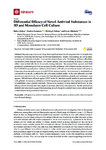Differential Efficacy of Novel Antiviral Substances in 3D and Monolayer Cell Culture
Koban, Robert
Neumann, Markus
Nelson, Philipp P.
Ellerbrok, Heinz
Repurposing of approved drugs that target host functions also important for virus replication promises to overcome the shortage of antiviral therapeutics. Mostly, virus biology including initial screening of antivirals is studied in conventional monolayer cells. The biology of these cells differs considerably from infected tissues. 3D culture models with characteristics of human tissues may reflect more realistically the in vivo events during infection. We screened first, second, and third generation epidermal growth factor receptor (EGFR)-inhibitors with different modes of action and the EGFR-blocking monoclonal antibody cetuximab in a 3D cell culture infection model with primary human keratinocytes and cowpox virus (CPXV) for antiviral activity. Antiviral activity of erlotinib and osimertinib was nearly unaffected by the cultivation method similar to the virus-directed antivirals tecovirimat and cidofovir. In contrast, the host-directed inhibitors afatinib and cetuximab were approx. 100-fold more efficient against CPXV in the 3D infection model, similar to previous results with gefitinib. In summary, inhibition of EGFR-signaling downregulates virus replication comparable to established virus-directed antivirals. However, in contrast to virus-directed inhibitors, in vitro efficacy of host-directed antivirals might be seriously affected by cell cultivation. Results obtained for afatinib and cetuximab suggest that screening of such drugs in standard monolayer culture might underestimate their potential as antivirals.
Files in this item

